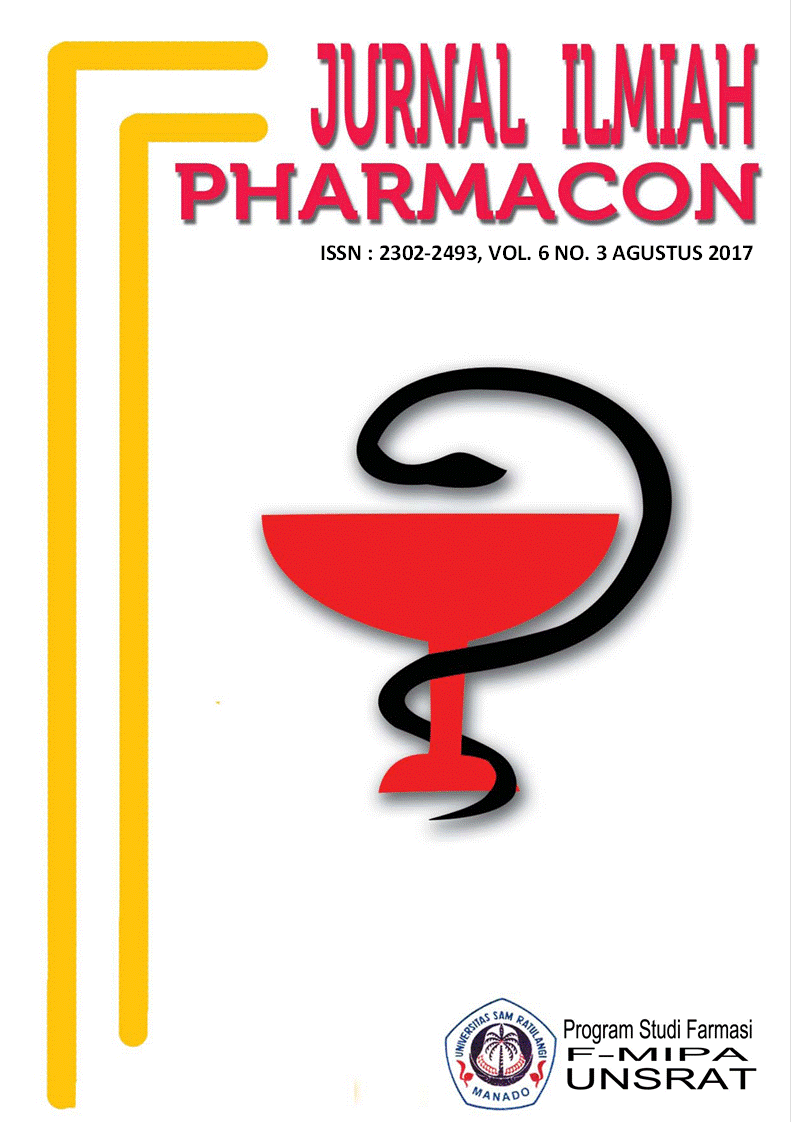FAKTOR RISIKO TERJADINYA GAGAL GINJAL KRONIK DI RSUP PROF. DR. R. D. KANDOU MANADO
DOI:
https://doi.org/10.35799/pha.6.2017.16831Abstract
FAKTOR RISIKO TERJADINYA GAGAL GINJAL KRONIK DI RSUP PROF. DR. R. D. KANDOU MANADO
Intan Logani1), Heedy Tjitrosantoso1), Adithya Yudistira1)
1)Program studi farmasi FMIPA UNSRAT Manado, 95115
Â
ABSTRACT
Â
Risk factors are factor which can increase the incidence of a disease. Chronic Kidney Disease (CKD) is a progressive development of kidney disease and usually lasts for one year. Increased chronic renal disease can be caused by several risk factors. This study aims to find out what are the risk factors of Chronic Kidney Disease (CKD) in the Prof. Dr. R. D. Kandou Hospital, Manado. This type of research is included in the type of observational research with prospective data retrieval. This research was conducted prospectively during December 2016 - February 2017 at the inpatient installation of Prof. Dr. R. D. Kandou Hospital, Manado. This study was conducted on 50 records of patient medical records and through interviews of respondents with chronic kidney disease. The results showed that the risk factors of Chronic Kidney Disease in inpatients at Prof. Dr. R. D. Kandou Hospital, Manado was the patient with a history of hypertension, uric acid, diabetes mellitus, with a long history of ≥10 years of illness, irregular use of medication during previous history, and the use of painkillers. Other risk factors lie in the patient's lifestyle which includes smoking habits, meat consumption, coffee consumption, high salt content consumption, excessive sugar consumption, lack of sleep and lack of exercise.
Â
Keywords: Risk factor, Chronic Kidney Disease (CKD)
Â
ABSTRAK
Faktor risiko adalah suatu faktor yang dapat meningkatkan timbulnya suatu penyakit. Gagal Ginjal Kronik (GGK) merupakan perkembangan gagal ginjal yang bersifat progresif dan biasanya berlangsung selama satu tahun. Meningkatnya penyakit gagal ginjal kronik dapat disebabkan oleh beberapa faktor risiko. Penelitian ini bertujuan untuk mengetahui apa saja faktor risiko terjadinya Gagal Ginjal Kronik (GGK) di RSUP Prof. Dr. R. D. Kandou Manado. Jenis penelitian ini termasuk dalam jenis penelitian observaional dengan pengambilan data secara prospektif. Penelitian ini dilakukan secara prospektif selama bulan Desember 2016 – Februari 2017 di instalasi rawat inap RSUP Prof. Dr. R. D. Kandou Manado. Penelitian ini dilakukan terhadap 50 catatan rekam medik pasien dan melalui wawancara terhadap responden dengan penyakit gagal ginjal kronik. Hasil penelitian menunjukan bahwa faktor risiko terjadinya Gagal Ginjal Kronik pada pasien rawat inap di RSUP Prof. Dr. R. D. Kandou Manado ialah pasien dengan riwayat hipertensi, riwayat asam urat, riwayat diabetes melitus, dengan lama menderita riwayat penyakit ≥10 tahun, penggunaan obat yang tidak teratur selama menderita riwayat penyakit dahulu, serta penggunaan obat penghilang nyeri. Faktor risiko lain terdapat pada pola hidup pasien yang meliputi kebiasaan merokok, konsumsi daging, konsumsi kopi, konsumsi kandungan garam tinggi, konsumsi gula berlebihan, kurang tidur dan kurang olahraga.Kata Kunci : faktor risiko, gagal ginjal kronik (GGK)
Â
Â
Downloads
Published
How to Cite
Issue
Section
License
Authors who publish with this journal agree to the following terms:
- Authors retain copyright and grant the journal right of first publication with the work simultaneously licensed under a Creative Commons Attribution-NonCommercial 4.0 International License that allows others to share the work with an acknowledgement of the work's authorship and initial publication in this journal.
- Authors are permitted and encouraged to post their work online (e.g., in institutional repositories or on their website) prior to and during the submission process, as it can lead to productive exchanges, as well as earlier and greater citation of published work (See The Effect of Open Access)










